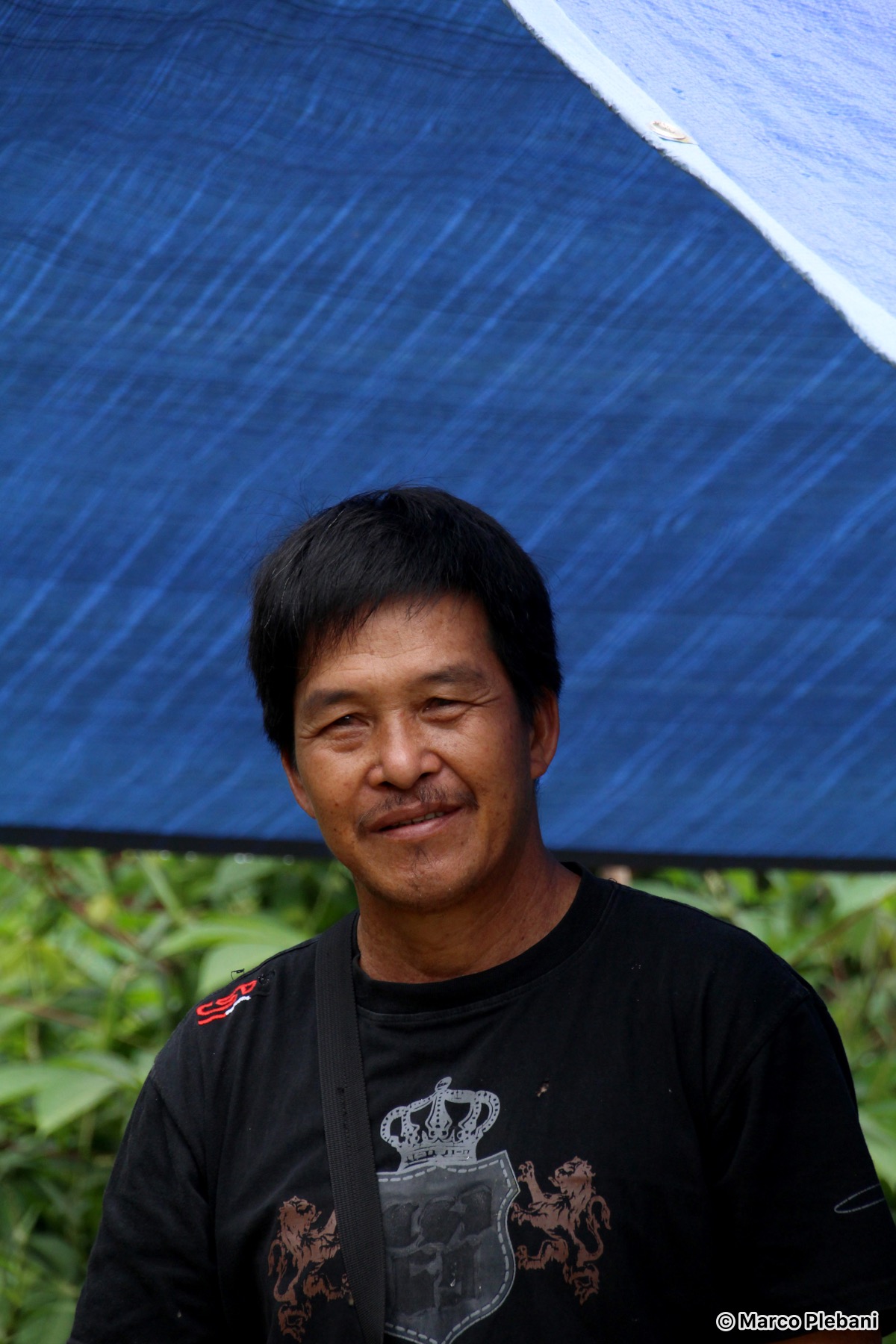
I hitched a ride on a motorbike to Long Umung, and from there I joined two kids, Boso and Inki, who were walking back to their home in Wa’ Yangun. Soon the sunny, hot plains were behind us and the forest welcomed us with its shade. The sounds of the forest, after a few days without hearing them, felt dense and mixed with the heavy, humid air, in a sort of strange synesthesia. We walked for four hours on a path so good that it reminded me of some European trails, only at times ruined by the passage of water buffalo and motorbikes that somebody managed to push up the steep slopes.
Wa’ Yangun was a little village in the hills, on the fringe of the virgin forest. It was a Lundayah village, like all the others on the Indonesian part of the Kelabit Highlands. Their language, I was told, was similar to that of the Kelabit, their neighbours on the Malaysian side of the border. Wa’ Yangun was the village of origin of Ali’s wife, and they gave me a letter of reference for Yusia Padan, Ali’s brother-in-law. Yusia was the local teacher, he did not speak any english, but after reading the letter he promptly offered me a bed in his house.
Making any progress past Wa’ Yangun proved, once again, difficult. Barely anybody in the village seemed to speak any english, and my Malay, even with the help of a translating app on my phone, would still allow only basic communication. I could feel that the East coast of the island was near: looking at the map, I only needed to make it from there to one of the affluent of the Tarakan River to be able to reach the coast by longboat. In reality, those few centimetres of uninterrupted green on my very approximate map of Borneo were proving challenging. In truth, my printed map was proving very unhelpful, showing where there weren’t any and not showing all the small remote villages that were essential stops on my way. For the past few weeks I had been relying on a hand-drawn map sketched over two pages of my journal, to which all those that knew or seemed to know useful bits of information were adding a few toponyms and lines.
My goal was to find a way and a guide to Long Berang, a remote hamlet by a river from where I could have continued to Melinau by boat. Was Long Berang one day away? Or five? I could not understand. Every bit of information was confused and difficult to obtain. These are some of my notes from my journal during those days:
“January 25th-29th, 2015. Wa’Yangung. […] The confusion about the feasibility of the trip, the time necessary and the guides available is unbelievable. Walking to Long Berang might or might not be possible, could take any time between three and seven days. From there, some say that there are longboats for sure, while others are sure that the river there is too shallow to be navigable. It is as nothing is known for sure, yet everybody is thoroughly convinced of what they say. A woman tells me that Manto, her husband, can guide me there. “For sure!” she tells me while he, who does not speak english, sits besides her. The talk to each other, she acts confident and cheerful, I think I finally have my guide. Yet a day later Boso tells me that Manto went to Long Berang only once, but can’t remember the whole way. Another day passes, and Boso tells me that Manto walked to Long Berang with is his father, who knows the way well and can guide me there. I then meet with Boso’s father, Yunus. He is old but inspires my trust. His wiry physique tells a story of long experience in the forest. We agree on leaving in a couple of days because Yunus has some stomach sickness, but all seems set. I hire Yunus and Boso, we even discuss their daily fare. But again, via half sentences that I grasp from conversations, I gather that Yunus hurt his leg with a parang months earlier and he still cannot walk for long. I ask Boso, who confirms. When I ask why they did not tell me right away he replies that ‘his father forgot’. The ‘belly bug’ story had only been an excuse, perhaps to not admit to himself that he was not fit for the job, perhaps to avoid disappointing me.“
The villagers would keep talking about my situation among theirselves: “Jalan… Ke Long Berang… Manto… Boleh?… Tidak… Yunus… Labo…” They kept mentioning the same handful of names of potential guides but everything would always end up in nothing: one would be nowhere to be found, another would be busy in the rice fields, another would claim to be afraid of hantu hutan, the spirits of the forest. It was a village of maybe a hundred people, so they must have known within hours from my arrival that there was no-one willing or able to guide me to Long Berang. Yet they continued with their empty talks, setting my hopes up for nothing. Their conversations began to look almost like a ritual, or merely a way to fill the time left empty from tending to the rice fields, cooking, and eating. In fairness, I began to feel depressed and despondent, and that embittered my opinion of the place and the people. The villagers of Wa’ Yangun were probably just shy or intimidated by me. My impatience was showing and was putting them off. The months of travelling were beginning to affect my patience and my good mood – two crucial ingredients to succeed in an expedition like mine. My sense of adventure and discovery was wearing off. At that point I was just a guy slugging his way through the forest, trying to get to the coast.


